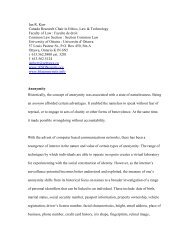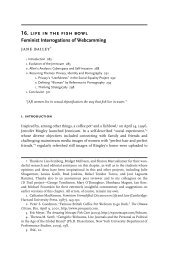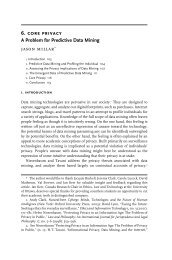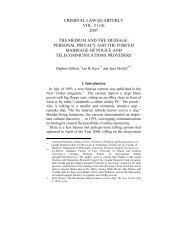Complete Cases Chart - Supreme Court of Canada - On the Identity ...
Complete Cases Chart - Supreme Court of Canada - On the Identity ...
Complete Cases Chart - Supreme Court of Canada - On the Identity ...
You also want an ePaper? Increase the reach of your titles
YUMPU automatically turns print PDFs into web optimized ePapers that Google loves.
Case Name (<strong>Court</strong>)<br />
(Judge)<br />
Location/Method <strong>of</strong> Search Relevant Statutes Issues/Holdings<br />
- (1) whe<strong>the</strong>r <strong>the</strong> search violates s. 8 <strong>of</strong> <strong>the</strong>C<strong>Chart</strong>er? - Y/N<br />
- (2) whe<strong>the</strong>r to exclude evidence by s. 24(2)? – Y/N<br />
Reasoning<br />
- (1) relevant to s.8 + CASES (Kokesch, Plant, Hunter, Tessling, Edwards)<br />
- (2) relevant to 24(2) + CASES (Collins)<br />
accused’s keys were seized,<br />
allowing entrance to his van.<br />
- Police searched <strong>the</strong> van a<br />
second time after arresting<br />
<strong>the</strong> accused and a hydro bill<br />
was seized.<br />
NO<br />
believes on reasonable and probable grounds that <strong>the</strong> accused has committed an<br />
indictable <strong>of</strong>fence and where such grounds are objectively justifiable. He need not<br />
establish a prima facie case for conviction before arresting.”<br />
-“A search may occur before or after formal arrest as long as <strong>the</strong> grounds for <strong>the</strong><br />
arrest exist prior to <strong>the</strong> search. A police <strong>of</strong>ficer is entitled to make a reasonable<br />
search <strong>of</strong> <strong>the</strong> person arrested and <strong>the</strong> place where he is arrested. See R. v. Debot,<br />
(1986), 30 C.C.C. (3d) 207 (<strong>On</strong>t. C.A.) at 233. Specifically, police <strong>of</strong>ficers are<br />
entitled to search an accused and <strong>the</strong> car driven by him which is in <strong>the</strong> immediate<br />
surrounding area as an incident <strong>of</strong> lawful arrest. See R. v. Speid (17 September,<br />
1992) [sic] (<strong>On</strong>t. C.A.) [since reported, (1991), 8 C.R.R. (2d) 383], leave to appeal<br />
refused, May 7, 1992).”<br />
- (3) The police were acting in good faith, <strong>the</strong>re was no capriciousness, and <strong>the</strong><br />
warrant could have been issued based on <strong>the</strong> circumstances. Excluding <strong>the</strong> evidence<br />
is more likely to bring <strong>the</strong> administration <strong>of</strong> justice into disrepute than admitting it.<br />
R. v. Jopowicz<br />
1992 CanLII 815<br />
(BC C.A.)<br />
Hollinrake J.A.;<br />
Legg and Rowles<br />
JJ.A. (con).<br />
* Final Level<br />
Surveillance -<br />
wiretap<br />
- An undercover police<br />
<strong>of</strong>ficer taped a conversation<br />
using a concealed recording<br />
device.<br />
- The recordings were made<br />
in <strong>the</strong> accused’s place <strong>of</strong><br />
business, which he owned,<br />
and in <strong>the</strong> undercover<br />
<strong>of</strong>ficer’s car.<br />
- <strong>Chart</strong>er, s.8. - (1) Did recording <strong>the</strong> conversation without a<br />
warrant violate <strong>the</strong> accused’s s.8 rights?<br />
• YES<br />
- (2) Should <strong>the</strong> evidence be excluded?<br />
• NO<br />
- Ref. to Kokesch (boundaries <strong>of</strong> a perimeter search; police must act in good faith).<br />
- (1) It was conceded that <strong>the</strong> recording was an unreasonable search and seizure<br />
(violation <strong>of</strong> s.8).<br />
- (2) The onus is on <strong>the</strong> accused to establish that admitting evidence would bring <strong>the</strong><br />
administration <strong>of</strong> justice into disrepute.<br />
-Following Duarte and Wiggins:<br />
• Police acted in good faith regarding <strong>the</strong>ir understanding <strong>of</strong> <strong>the</strong> law (<strong>the</strong>y<br />
thought one-party consent was sufficient for taping).<br />
• Police could have obtained judicial authorization – <strong>the</strong>y had reasonable and<br />
probable grounds, not mere suspicion. If <strong>the</strong>re were no reasonable/probable<br />
grounds it would bring <strong>the</strong> administration <strong>of</strong> justice into disrepute to admit <strong>the</strong><br />
evidence.<br />
- There was some discussion <strong>of</strong> <strong>the</strong> need to exhaust o<strong>the</strong>r investigative techniques<br />
before applying for judicial authorization to tape conversations.<br />
R. v. Ericson<br />
[1991] B.C.J. No.<br />
3763<br />
McFarlane J.A.; Legg<br />
and Hollinrake JJ.A.<br />
(con).<br />
- <strong>On</strong> suspicion <strong>of</strong> having<br />
stolen 33 pieces <strong>of</strong> art from a<br />
gallery, <strong>the</strong> police conducted<br />
a warantless search <strong>of</strong> <strong>the</strong><br />
outside <strong>of</strong> <strong>the</strong> appellant's<br />
residence from which<br />
suspected stolen art could be<br />
- <strong>Chart</strong>er, ss. 8;<br />
- Criminal Code, R.S.C.<br />
1985, c. C-46, ss. 355.<br />
- (1) By searching <strong>the</strong> perimeter <strong>of</strong> <strong>the</strong><br />
accused’s house without a warrant, did <strong>the</strong><br />
police violate s. 8 <strong>of</strong> <strong>the</strong> <strong>Chart</strong>er?<br />
• YES (based on Kokesch)<br />
- Ref. to Hunter (s. 8 protects reasonable expectation <strong>of</strong> privacy).<br />
- (1) Although <strong>the</strong> search violated s.8, it was conducted in good faith, and given <strong>the</strong><br />
accused's extensive criminal record, <strong>the</strong> trial judge properly considered <strong>the</strong><br />
protection <strong>of</strong> <strong>the</strong> public to be a dominant factor.<br />
- Ref. to Kokesch (evidence obtained through <strong>Chart</strong>er breach invalid; police must<br />
act in good faith).<br />
44







